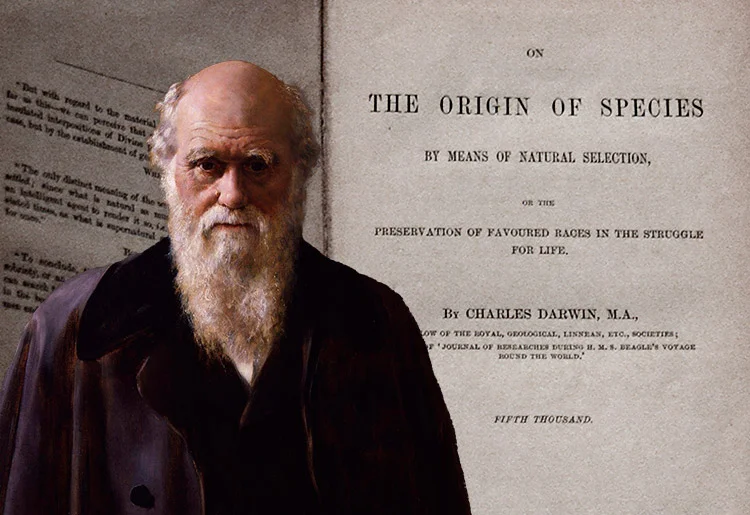|| 1 || Adieu Darwin!
The job is done at last. In both Bangladesh and India. This is something where we stand now in the same row as Saudi Arabia, Turkey, Oman or Lebanon.
In both these countries a campaign had been let loose for some years past that claimed the theory of evolution as wrong and demanded its expulsion from school curriculum. The Hindu and Islamic fundamentalists nicely concur on this issue. When the BJP came to the Union Government for the second time, some ministers started prattling against Darwinism. Now as advised by the RSS, the Union government thought of dropping Darwin’s theory of evolution in Classes IX-X, calling it Rationalization of the Curriculum. The axe fell upon Darwin’s theory in the school curriculum of science for secondary level. The rationale is also ready: During the Covid crisis students had little scope to make regular study and were under stresses of various kinds. In the immediate post-Covid situation it was highly advisable to reduce load. Those who will pursue science in the +2 level, will be surely instructed in that theory. This is for the time being . . .
However, don’t think NCERT is a club of blockheads. Just try to understand why they simultaneously removed the chapter on periodic table from the physical sciences at the secondary level. The implicit message is, now no rationalist could say that this was also owing to the pressure of the fundamentalists.
The attempt though puerile is a remarkable feat.
Recently we came to know that Bangladesh had also decided to bid farewell to Darwin in the school syllabus. Although not so much in Europe, the Christian fundamentalists in the USA are quite active in fighting Darwinism. On account of these facts all around a question perturbs me: Why these three legions of powerful religious fundamentalism—namely, Hindu, Christian and Islamic—are so much allergic to Darwin’s theory. Is it because the theological knowledge of plants and animals does not tally with Darwin’s treatises?
Not perhaps.
What religions taught about matter and its motion does not agree with the knowledge of mechanics developed by Galileo Galilei or Isaac Newton. Even then the chieftains of these three religions are not angry with Galileo or Newton. Traditional astrology also does not come anywhere near modern astronomy. Still the believing people did not oppose or demand abolition of astronomy in the educational programme. And in no religion of whatever the land is there any discourse on mathematics—say in Geeta, Quran, Bible, Tripitak, and so on. The believing sects do not claim the standard mathematics to be wrong.
If that be so, when Galileo, Newton, Einstein, Hawking, and similar others are passed through religious filters, when even Iran, Pakistan, Saudi Arab, Bangladesh and India have all accepted mechanics, chemistry, astronomy, cosmology, mathematics and physics, what is special about Darwin and his theory of organic evolution that makes him a common target of all religious companies? Why is Darwinism the HCF of all the fundamentalists of the Hindu, Muslim and Christian faiths? Let us try to get at that.
|| 2 || Lamarck, No; Wallace, No; Darwin alone
Charles Darwin was not the first to talk of the evolution of life forms from one another. Some Greek thinkers had speculated on this. Certain traditionalists claim that the stories of incarnation of Lord Vishnu in the Puranic literature of ancient India contain the seed of evolutionary proposition. A disciple of Aurabindo had once argued that the appearance of Vishnu serially in the form of fish, turtle, bear etc. till his assuming human form indicated evolution (we refrain from asking why Vishnu had preferred to avoid taking any invertebrate form).
Well, well. Let us agree.
But we hear no BJP spokesman say, since my father or forefathers did not see turtles evolve out of fishes and a bear out of a turtle, Vishnu Puran story is a hoax. No Christian or Islamic clergy has been reported rejecting the stories of Noah.
In the post-Renaissance Europe many people went out on tour to various countries for divergent purposes— outdoor trip, trade and commerce, plunder of resources from abroad, slave trade, etc. They found on the way many new plants and animals they never met in their home lands. Some of them observed a lot and collected a large
number of samples for further study that led them towards an evolutionary perception of the organic world like French materialist Denis Diderot, German mathematician Pierre Louis Maopartuis, the grandfather of Charles Darwin Erasmus Darwin, the naturalist Alexander Humboldt, Jean Cuvier, Compte de Buffon, and so on.
In the nineteenth century Jean Baptiste Lamarck was the first distinguished and powerful theorist of evolution who presented a systematic explication of the transmutation of species in a treatise published in 1809, the year Darwin was born. Lamarck has been described as a Deist in his philosophical thoughts. But many people do not agree to this characterisation. These analysts understood the position of Lamarck but did not thoroughly grasp his philosophy. Since the time of Nicaulus de Cusa, Giordano Bruno and Baruch Spinoza deists actually tried to merge God with nature and thereby extend the life span of the providence. In fact, as Georgi Plekhanov, a renowned thinker of Russia at the turn of the twentieth century had observed, “In modern civilised societies, alongside the efforts to limit the powers of kings, came the trend towards “natural religion” and to deism, that is, to a system of ideas wherein the power of God is restricted on all sides by the laws of Nature. Deism is celestial parliamentarism.” [Plekhanov 1976, 341] According to this theosophical position God can no more control the earthly affairs indiscriminately. Lamarck also left a similar message in his writings.
For he, as a child of the fire of the French Revolution, had uttered some strong words against the old theological conceptions about the organic world. For instance, he had written: “The ancient philosophers felt the necessity for a special exciting cause of organic movements; but not having sufficiently studied nature, they sought it beyond her; they imagined a vital principle, a perishable soul for animals, and even attributed the same to plants; thus in place of positive knowledge, which they could not attain from want of observations, they created mere words to which are attached only vague and unreal ideas.”
Accordingly he concluded: “Whenever we abandon nature, and give ourselves up to the fantastic flights of our imagination, we become lost in vagueness, and our efforts culminate only in errors. The only knowledge that it is possible for us to acquire is and always will be confined to what we have derived from a continued study of nature’s laws; beyond nature all is bewilderment and delusion: such is my belief.” [Lamarck 1914, 211-12; emphasis added]
In a word, Lamarck believed that all the narratives about the organic beings in the ancient scriptures and sacred texts were wrong, unreal and unfounded, and hence of no use at all. In order to learn the truth and study organic creatures the only way is to study nature, observe and determine the laws of nature. Even then the religious bigots are not so unhappy with Lamarck.
By the way, Lamarckian theory is quite simple and legible to anyone. Take the case of the giraffe. At some time long past some giraffes had been trying to catch the leaves of a big tree by stretching their necks causing a lasting change in later generations. This explication is not only simple but very convincing too. As a result those who explain evolution in the classes or in public talks also in most cases push Lamarck’s theory under the label of Darwinism. For example, let us take the oft-heard statement—Darwin’s theory states that man came from a group of apes that climbed down trees to find a better habitat thus going through changes like use of forelimbs, disappearance of tail etc. This is not merely a wrong idea but it shelters Lamarckian evolutionism under the phrases.
In spite of having ample scope to do so, Darwin in his celebrated Origin of Species had nowhere ridiculed God. Out of his usual gentleness and more probably as a part of emotional love for his religiously committed wife Emma. In his Autobiography, of course, he had expressly stated that he had lost all faith in Christianity and its God since 1836. The religious people are much tolerant of the outspoken ungodliness of Lamarck. But they cannot bear with the reticent Darwin. Religious literature is replete with vituperations against Darwin, with scores of cartoons about his theory.
We have to explore what the special reasons are behind this distaste. At the same time we have to distinctly demarcate Darwin’s position from Lamarck’s. Let us probe into why people talk in terms of Lamarckianism while thinking they are dealing with Darwin’s theory in the next issue.
The author is a science writer. He is the General Secretary for Centre for Studies in Science and Society [CESTUSS], Kolkata.
Sources:
Pietro Corsi (2009), “Evolution pioneers: Lamarck’s reputation saved by his zoology”; Nature 461, 167 (2009).
J. B. Lamarck (1914), Zoological Philosophy: An exposition with regard to the Natural History of Animals; Macmillan & Co., London.
Georgi Plekhanov (1976), “On the So-called Religious Seekings in Russia”; Selected Philosophical Works, Vol. III; Progress Publishers, Moscow.
Jacques Roger (1986). “The Mechanist Conception of Life”. In David C. Lindberg, and Ronald L. Numbers (1986 eds.), God and Nature: Historical Essays on the Encounter Between Christianity and Science. University of California Press.



